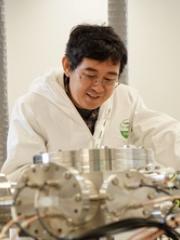Professor Jianxin Zhao

Researcher biography
Professor Zhao (PhD, ANU, 1993; MSc, Univ Adelaide, 1989; BSc, Nanjing Univ, 1985) has ~30 years research experience in isotope geochemistry and geochronology, with research interests straddling across the fields of geological, geochemical, geographical, environmental, ecological and archaeological sciences. He developed the mass spectrometry U-series dating methods at UQ and applied them to dating coral reefs in the Great Barrier Reef and other parts of the tropical oceans, karstic deposits (stalagmites, stalactites, flowstones, etc) and calcite veins across different continents, as well as important hominid and fauna records in China, South East Asia, Australasia, Europe and Polynesia, which have received widespread recognition and public attention. Most recently, his team has been developing laser-ablation ICP-MS in situ U-Th and U-Pb dating methods for applications in earth, environmental and archaeological research. Since 1991, Zhao have authored >350 refereed publications, won more than 50 competitive grants and contracts, supervised or mentored more than 50 research high-degree students and early-career researchers, and received one ARC APD fellowship (1995), one ARC research/QEII fellowship (1998), one UQ research excellence award (2001), one Chinese National Science Foundation distinguished overseas young scholar award (2000), and the prestigious inaugural Australian Museum Eureka Prize for Outstanding Mentor of Young Researchers (2011).
The Radiogenic Isotope Facility (RIF) that Prof Zhao took charge since 2005 is a ~200 m2 HEPA-filtered, fully-automated, ultra-clean low-blank chemistry and mass spectrometer laboratory, housing two Nu Plasma multi-collector ICP-MS instruments, two Thermo iCap-RQ and one Thermo X-series II quadrupole ICP-MS instruments, and two ASI RESOlution SE laser ablation systems for high-precision radiogenic/metal-stable isotope and trace element analysis in both solution and in situ laser-ablation modes. The facility is unique in its design and capabilities in Australia, representing one of only a small number of establishments with its level of analytical sophistication, range and quality of mass spectrometers and proven ultra-low analytical blank performance. It is widely acknowledged by peers in the field as being among of the most advanced facilities of its kind in the world. It services a multidisciplinary research community on campus, nationally and overseas in traditional earth science research, palaeoclimate, palaeoenvironmental and palaeoecological research, coral reef research, environmental science research, archaeological research, and forensic research.


